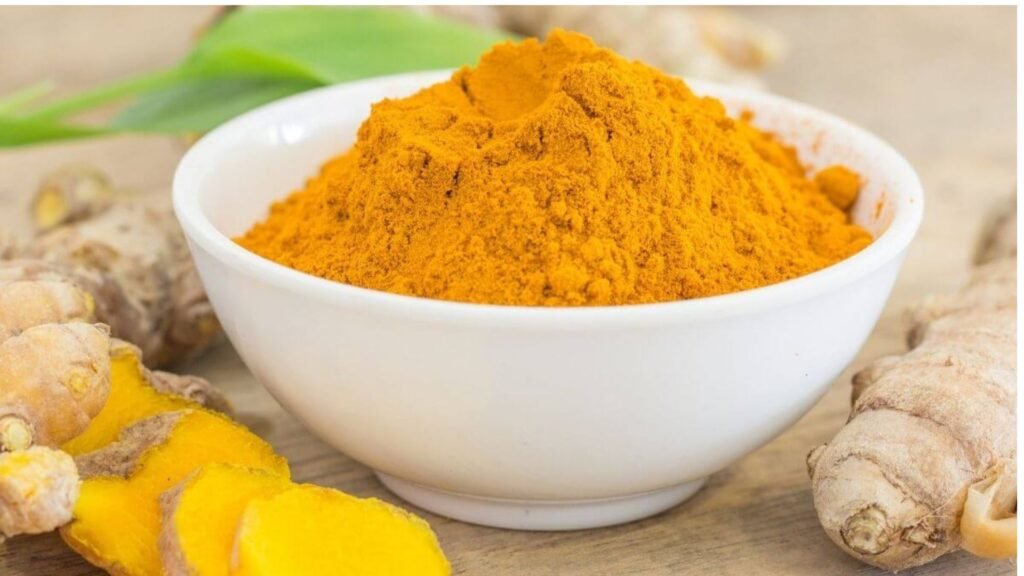Benefits of Turmeric
Turmeric (Curcuma longa), often referred to as “the golden spice,” is a bright yellow-orange root that has been prized for centuries in Ayurvedic and traditional medicine. It contains a bioactive compound called curcumin, which is responsible for many of its health benefits. Known for its potent anti-inflammatory, antioxidant, and antimicrobial properties, turmeric is used to support overall wellness, treat various conditions, and even prevent chronic diseases. In this article, we will explore the remarkable benefits of turmeric, its active compounds, and how you can incorporate it into your daily routine to enhance your health.

Anti-Inflammatory Properties
One of the most well-known benefits of turmeric is its ability to reduce inflammation. Chronic inflammation is associated with a wide range of health issues, including arthritis, heart disease, diabetes, and even cancer. Turmeric, especially its active compound curcumin, has powerful anti-inflammatory effects that can help manage and reduce these conditions.
- How It Helps: Curcumin inhibits several molecules involved in inflammation, including NF-kB (a transcription factor) and COX-2 (an enzyme associated with pain and inflammation). By blocking these molecules, curcumin helps prevent the release of pro-inflammatory cytokines.
- Studies: Research has shown that turmeric’s anti-inflammatory properties are comparable to those of non-steroidal anti-inflammatory drugs (NSAIDs), such as ibuprofen, but without the negative side effects.
Supporting Joint Health
Turmeric is especially beneficial for people suffering from conditions like osteoarthritis and rheumatoid arthritis. Its anti-inflammatory effects can reduce swelling and improve mobility in the joints.
- How It Helps: Curcumin works to reduce the inflammation in the joints, which helps relieve pain, stiffness, and swelling. Many people with arthritis report significant relief from symptoms when they regularly consume turmeric.
- Studies: Clinical studies have found that turmeric can improve joint function and reduce symptoms of arthritis, making it a natural alternative to conventional pain relievers.
Antioxidant Benefits
Turmeric is a potent antioxidant, meaning it helps neutralize harmful free radicals in the body. Free radicals are unstable molecules that can damage cells and tissues, contributing to aging and the development of various chronic diseases, such as cancer, heart disease, and neurodegenerative conditions.
- How It Helps: Curcumin scavenges free radicals and enhances the activity of the body’s antioxidant enzymes, providing a robust defense against oxidative stress. By neutralizing free radicals, turmeric helps protect the body from cellular damage and promotes overall health.
Enhancing Antioxidant Enzyme Activity
In addition to its direct antioxidant effects, curcumin increases the activity of superoxide dismutase (SOD), catalase, and glutathione, which are some of the body’s most powerful natural antioxidants. These enzymes work synergistically to protect cells from oxidative damage and support immune function.
Brain Health and Cognitive Function
Emerging research suggests that turmeric may help boost brain health and prevent cognitive decline, particularly in aging individuals. Curcumin has the ability to cross the blood-brain barrier, which allows it to exert its beneficial effects directly on brain cells.
- How It Helps: Curcumin increases the levels of brain-derived neurotrophic factor (BDNF), a protein that plays a crucial role in supporting brain function and promoting the growth of new neurons. Low levels of BDNF have been linked to various brain disorders, including depression and Alzheimer’s disease.
- Studies: Studies have shown that regular consumption of turmeric can improve memory, cognitive performance, and mood in both older adults and people with mild cognitive impairment. In one study, participants who took curcumin supplements experienced improved attention and processing speed.
Preventing Alzheimer’s Disease
Research suggests that turmeric may help protect against Alzheimer’s disease by reducing the buildup of amyloid plaques, which are characteristic of this condition. Curcumin’s anti-inflammatory and antioxidant properties may help prevent the formation of these plaques and improve brain health.
Heart Health Benefits
Turmeric has significant cardiovascular benefits, thanks to its anti-inflammatory, antioxidant, and cholesterol-lowering properties. It can help reduce the risk of heart disease by supporting healthy blood circulation, reducing cholesterol levels, and preventing the oxidation of LDL (bad cholesterol).
- How It Helps: Curcumin helps reduce the levels of C-reactive protein (CRP), a marker of inflammation in the body. High CRP levels are linked to an increased risk of heart disease. Additionally, turmeric helps improve the function of the endothelium, the thin layer of cells lining blood vessels, which plays a key role in regulating blood pressure and clotting.
- Studies: Some studies have shown that curcumin can help reduce total cholesterol and triglycerides while increasing HDL (good cholesterol). It also improves arterial health by preventing plaque buildup in the arteries.
Improving Blood Circulation
By supporting endothelial function, turmeric promotes healthy blood flow and reduces the risk of blood clots. This can help reduce the risk of heart attack and stroke.
Conclusion
Turmeric is an incredibly powerful herb with a wide range of health benefits. From its potent anti-inflammatory and antioxidant properties to its ability to support brain health, heart health, and digestive health, turmeric offers natural support for a variety of conditions. Whether you consume it as a spice in food, a supplement, or as a topical treatment, turmeric can play a crucial role in improving your overall wellness.



